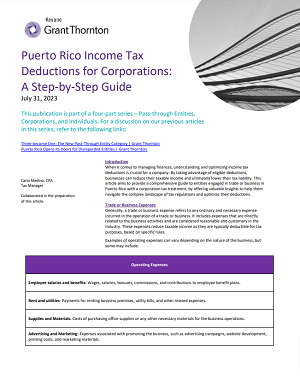-
Financial statements audits
Financial statement audits
-
Compliance audits
Compliance audits
-
Compilations and reviews
Compilations and audit
-
Agreed-upon procedures
Agreed-upon procedures
-
Corporate and business tax
Our trusted teams can prepare corporate tax files and ruling requests, support you with deferrals, accounting procedures and legitimate tax benefits.
-
International tax
Our teams have in-depth knowledge of the relationship between domestic and international tax laws.
-
Tax compliance
Business Tax
-
Global mobility services
Through our global organisation of member firms, we support both companies and individuals, providing insightful solutions to minimise the tax burden for both parties.
-
Sales and use tax and indirect taxes
SUT/ VAT & indirect taxes
-
Tax incentives program
Tax incentives program
-
Transfer Pricing Study
The laws surrounding transfer pricing are becoming ever more complex, as tax affairs of multinational companies are facing scrutiny from media, regulators and the public

-
Business consulting
Our business consulting services can help you improve your operational performance and productivity, adding value throughout your growth life cycle.
-
Business Risk Advisory
Risk is inevitable but manageable. We deliver relevant, timely and practical advices to aid organizations manage risk and improve business performance. We can help you identify, understand and manage potential risks to safeguard your business and comply with regulatory requirements.
-
Technology Advisory
We provide comprehensive solutions to safeguard your business and ensure operational resilience and compliance. Our expert team offers a range of technology advisory services designed to address your cybersecurity needs, enhance business continuity, and manage security effectively.
-
Transactional advisory services
Transactions are significant events in the life of a business – a successful deal that can have a lasting impact on the future shape of the organizations involved. Because the stakes are high for both buyers and sellers, experience, determination and pragmatism are required to bring deals safely through to conclusion.
-
Forensic and investigative services
At Grant Thornton, we have a wealth of knowledge in forensic services and can support you with issues such as dispute resolution, fraud and insurance claims.


This publication is part of a four-part series – Pass-through Entities, Corporations, and Individuals. For a discussion on our previous articles in this series, refer to the following links:
Three become One: The New Pass-Through Entity Category | Grant Thornton
Puerto Rico Opens its Doors for Disregarded Entities | Grant Thornton
Introduction
When it comes to managing finances, understanding and optimizing income tax deductions is crucial for a company. By taking advantage of eligible deductions, businesses can reduce their taxable income and ultimately lower their tax liability. This article aims to provide a comprehensive guide to entities engaged in trade or business in Puerto Rico with a corporation tax treatment; by offering valuable insights to help them navigate the complex landscape of tax regulations and optimize their deductions.
Trade or Business Expenses
Generally, a trade or business expense refers to any ordinary and necessary expense incurred in the operation of a trade or business. It includes expenses that are directly related to the business activities and are considered reasonable and customary in the industry. These expenses reduce taxable income as they are typically deductible for tax purposes, based on specific rules.
Examples of operating expenses can vary depending on the nature of the business, but some may include:
|
Operating Expenses |
|
Employee salaries and benefits: Wages, salaries, bonuses, commissions, and contributions to employee benefit plans. |
|
Rent and utilities: Payments for renting business premises, utility bills, and other related expenses. |
|
Supplies and Materials: Costs of purchasing office supplies or any other necessary materials for the business operations. |
|
Advertising and Marketing: Expenses associated with promoting the business, such as advertising campaigns, website development, printing costs, and marketing materials. |
|
Professional services: Fees paid to lawyers, accountants, consultants, or other professionals providing services to the company. |
|
Travel, meals and entertainment: Costs incurred for business-related travel, accommodation, meals, and entertainment, as long as they are directly related to the business and meet specific criteria set by tax regulations. |
|
Insurance premiums: Payments for insurance coverage related to the business, such as general liability insurance, property insurance, or professional liability insurance. Practice Point:These payments must be made to an authorized insurer in Puerto Rico in order to be deductible in the Puerto Rico tax return. Otherwise, they are disallowed and will result in an add-back to the income. |
|
Depreciation and amortization: Deductions for the gradual wear and tear, deterioration, or obsolescence of assets used in the business, such as equipment, vehicles, or computer systems. |
Deductions on the Puerto Rico Corporate Income Tax Return
Aiming to heighten its scrutiny over business deductions, the Puerto Rico Government and Treasury have imposed more rigorous requirements to allow taxpayers to claim certain expenses in their returns. Before these changes, claiming a deduction was simpler and it generally required the taxpayer to document it on their books, and be prepared to justify it as a reasonable, necessary, and ordinary business expense. Now, the availability to claim certain expenses entails more than proper documentation.
As part of this discussion, it is important to mention that in Puerto Rico, corporations may be subject to both regular tax and alternative minimum tax (AMT). Furthermore, there are some key differences between the rules and deductions for regular and AMT to consider.
Under regular tax rules, corporations in Puerto Rico can typically deduct business expenses, such as salaries, rent, utilities, advertising, and professional services; subject to certain limitations, and guidelines, and that the applicable informative tax filings are timely made.
Nevertheless, in order to claim certain deductions for AMT purposes, the corporation must include with the income tax return Audited Financial Statements (AFS) or an Agreed Upon Procedures. Both should be prepared by a CPA with a valid license from Puerto Rico. Entitiesthat are not part of a controlled group of related entities are required to submit AFS with their tax returns if their annual volume of business totals or exceeds more than $10 million.
In the case of entities that belong to a controlled group of related entities, the rule is different. They may be required to submit AFS with their Puerto Rico income tax return if their combined annual volume of business is $10 million or more. The test to verify if the AFS is required is made by each individual entity. If the entity’s gross volume equals or exceeds $3 million, it must include AFS. Nonetheless, if the entity’s gross volume is less than $3 million, it must submit an AUP or has the option to submit AFS to claim the expenses for AMT purposes. The decision to prepare one or the other is based on their cost and usefulness. AFS can also be used for bank purposes, may be required by suppliers, or to address other business needs. AUPs may be less costly but their use is more limited since they are specifically prepared for the income tax return.
There are three categories of income tax deductions in the return. They are as follows: (1) Deductions that must be reported on informative returns, (2) Deductions that are not required to be reported on informative returns, and (3) Other deductions that are required to be reported in AFS or AUPs. The rationale for these classifications is to ease the tax return review process for the PR Treasury. Therefore, the reporting requirements are higher for those expenses that are more difficult to verify through a secondary source.
The first category of the aforementioned tax deductions includes certain expenses that in order to be claimed on the tax return, the taxpayer must validate them with the filing of informative returns (Forms 480). It was a challenge for PR Treasury to match the deduction and income on this type of expense and it is why they decided to implement this process. Although it could be done by the same taxpayer, since it is an automated process, it facilitates their review.
These forms are due annually by the end of February, but even if they are not filed on time, the corporation may claim the deduction and it will be subject to a late filing penalty of $500 per each informative.
Practice Point: If the company fails to meet the deadline, it is suggested to analyze the impact of the deduction versus the cost of the penalty to be incurred. In most cases, the tax savings would be higher than the penalties to be incurred.
The second category consists of several other deductions as indicated in the summary provided below.
Finally, the deductions subject to AFS or AUP indicated on the third category of expenses must be supported by these reports to validate the deductions for purposes of AMT.
Practice Point: There are further requirements on this category of expenses, such as the payment of sales and use tax and filing of the respective monthly tax returns, that will also be taken into consideration for the application of the deduction.
Below, we include a summary of the expenses included within these three types of categories reported on the Puerto Rico Corporation Income Tax Return (Form 480.20).
|
TAX DEDUCTIONS |
|
1. Deductions that must be reported on informative return: |
|
|
|
|
|
|
|
|
|
|
|
|
|
|
|
|
|
|
2. Deductions not reported on informative return: |
|
|
|
|
|
|
|
|
|
3. Other deductions (subject to Audited Financial Statements or Agreed Upon Procedures to be allowable as a deduction for the determination of net income subject to AMT): |
|
|
|
|
|
|
|
|
|
|
|
|
|
|
|
|
|
|
|
Tax Planning
Effective tax planning is an important task because it allows entities to identify legitimate strategies and opportunities to minimize their tax liability. By understanding the tax laws, deductions, credits, and exemptions applicable to their business, corporations can optimize their financial position by reducing the amount of taxes they owe. In addition, they can ensure timely compliance with the informative return filings that are required for the PR Treasury to validate certain expenses claimed on the tax return and avoid the imposition of penalties for failure to file them.
By minimizing tax payments, businesses can strategically manage their cash flow and free up funds to reinvest in their operations, expand their business, or address other financial needs.
As indicated before, tax laws and regulations can be complex and subject to frequent changes. Engaging in tax planning ensures that corporations stay up to date with the latest rules and requirements. By proactively planning and structuring their finances in accordance with tax laws, businesses can remain compliant, avoiding penalties, fines, and potential legal issues.
In summary, tax planning is crucial for corporations and helps positioning themselves for long-term success. We recommend taxpayers consult their tax advisors near year-end to project next year’s expenses, review their filing requirements, and timely engage the team of professionals that will be assisting them to comply with the informative returns, AFS or AUPs. As part of this analysis, it is paramount that taxpayers model their tax liabilities to analyze and determine if it is cost-effective to prepare either the AFS or AUPs. We have highly prepared professionals that are available to support your business in navigating these analyses and assist you in determining the best course of action. Our portfolio of services includes assistance with the preparation of these supporting reports. Contact us to coordinate a meeting to discuss how we can support your business with these tax matters.
We are committed to keeping you up to date with all tax-related developments. Please contact our Tax Department, should additional information be required regarding this or any other tax issue. We will gladly assist you!
DISCLAIMER: This update and its content do not constitute advice. Clients should not act solely on the basis of the material contained in this publication. It is intended for information purposes only and should not be regarded as specific advice. In addition, advice from proper consultant should be obtained prior to taking action on any issue dealt with this update. Information provided in this publication may change in the future and such change may be applied retroactively. Kevane Grant Thornton LLP does not assume the responsibility to update this communication if the applicable laws change.
© 2023 Kevane Grant Thornton LLP All rights reserved. Kevane Grant Thornton LLP is a member firm of Grant Thornton International Ltd (GTIL). GTIL and the member firms are not a worldwide partnership. Services are delivered by the member firms. GTIL and its member firms are not agents of, and do not obligate, one another and are not liable for one another’s acts or omissions. Please visit www.grantthornton.pr for further details



